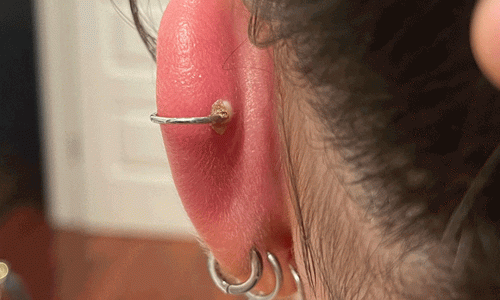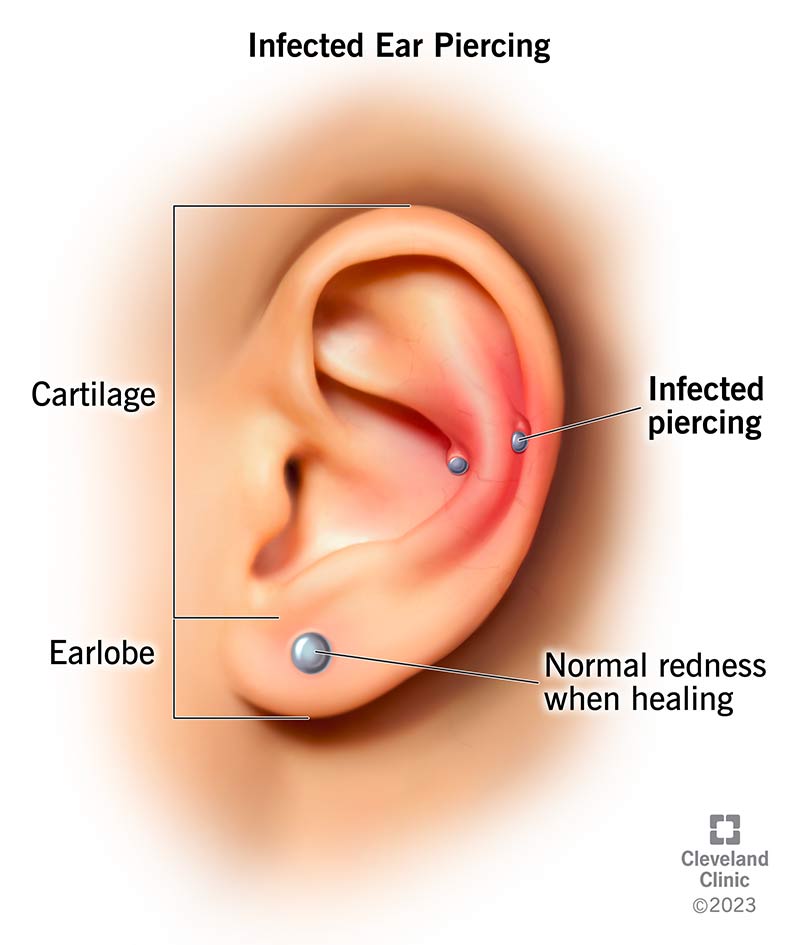Getting a piercing can be exciting. You may want to show off your new look. But sometimes, piercings can get infected. It is important to know the signs of an infection. In this article, we will help you understand how to check for an infection in your piercing.

Credit: www.essentialbeauty.com.au
What is a Piercing Infection?
A piercing infection happens when germs enter the skin. This can lead to swelling, pain, and other problems. Infections can happen in any type of piercing. The most common are ear, nose, and belly button piercings.
Signs of an Infected Piercing
It is important to know the signs of an infection. Here are some common signs:
- Redness: The area around the piercing may look red.
- Swelling: The piercing may feel larger than normal.
- Pain: You may feel pain or tenderness.
- Heat: The area might feel warm to touch.
- Pus: You may see yellow or green fluid.
- Fever: You may feel sick or have a fever.
What Causes Piercing Infections?
Several factors can cause infections in piercings. Here are some common causes:
- Unclean tools: Using dirty needles or jewelry can cause infections.
- Touching the piercing: Touching it with dirty hands can introduce germs.
- Swimming: Pools and lakes can have germs that cause infections.
- Improper care: Not cleaning your piercing can lead to problems.
How to Care for Your Piercing
Taking care of your piercing can help prevent infections. Here are some tips:
- Wash your hands: Always wash your hands before touching your piercing.
- Clean the area: Use a gentle soap and water to clean around the piercing.
- Use saline solution: A saline solution can help clean the piercing.
- Avoid swimming: Stay out of pools and lakes for at least a month.
- Do not change jewelry: Wait until the piercing is healed before changing it.
What to Do If You Suspect an Infection
If you think your piercing is infected, act quickly. Here are steps to take:
- Do not panic: Many infections can be treated easily.
- Keep it clean: Wash your hands and clean the area gently.
- Apply warm compresses: This can help reduce pain and swelling.
- Do not remove the jewelry: Removing it can trap the infection.
- Visit a doctor: If it gets worse, see a doctor.
When to See a Doctor
Sometimes, infections can be serious. You should see a doctor if:
- Your symptoms do not improve in a few days.
- You have a high fever or chills.
- You see a lot of pus or blood.
- You feel very sick or tired.
Complications of Untreated Infections
If you do not treat an infection, it can lead to problems. Here are some possible complications:
- Abscess: A painful lump filled with pus can form.
- Scarring: The skin may heal with scars.
- Blood infection: The infection can spread to the blood.
- Loss of jewelry: You may need to remove the jewelry.
Preventing Future Infections
To keep your piercing healthy, follow these steps:
- Choose a good piercer: Make sure they use clean tools.
- Follow aftercare instructions: Listen to what your piercer tells you.
- Be careful with makeup: Avoid putting makeup near the piercing.
- Stay healthy: Eat well and drink water to boost your immune system.

Credit: my.clevelandclinic.org
Frequently Asked Questions
How Can I Tell If My Piercing Is Infected?
Look for redness, swelling, or pus around the piercing. These signs often indicate an infection.
What Are Common Symptoms Of A Piercing Infection?
Common symptoms include pain, warmth, and unusual discharge from the piercing site.
Is It Normal For A New Piercing To Hurt?
Some pain is normal in the first few days. If it worsens, check for infection.
Can I Treat A Piercing Infection At Home?
You can clean it with saline solution and avoid touching it. Seek medical help if needed.
Conclusion
Knowing if your piercing is infected is important. Look for signs like redness, swelling, and pain. If you suspect an infection, take care of it quickly. Keep the area clean and see a doctor if needed. By following these tips, you can enjoy your piercing without worry.
Frequently Asked Questions
1. How Long Does It Take For A Piercing To Heal?
Healing time varies. It can take from a few weeks to several months.
2. Can I Use Alcohol To Clean My Piercing?
Avoid using alcohol. It can dry out the skin and delay healing.
3. What Should I Do If I Notice Blood?
Some bleeding is normal. If it continues, see a doctor.
4. Is It Normal For Piercings To Itch?
Itching can be normal. But if it is severe, check for signs of infection.
5. Can I Wear Makeup Near My Piercing?
It is best to avoid makeup until the piercing is healed.



